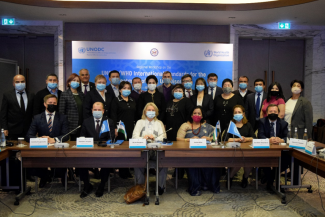UNODC promotes International Standards for the Treatment of Drug Use Disorders in Central Asia

13-14 December 2021 UNODC/WHO Regional Workshop on the International Standards for the Treatment of Drug Use Disorders (DUD) was held in Tashkent, Uzbekistan in hybrid format. 25 policymakers from Central Asia and high-level officials from Ministry of Health and other relevant ministries involved in policy development, planning, funding, delivery, monitoring and evaluation of treatment services and interventions for DUD attended the event. This UNODC/WHO workshop aimed to inform through sharing the International Standards for the Treatment of DUD (2020), the regional and national level discussions on strategies to increase the capacity of treatment systems to deliver ethical and evidence-based treatment services for the benefit of people affected by DUDs.
“Within the framework of joint programme on drug dependence treatment and care, UNODC and WHO developed the International Standards for the Treatment of Drug Use Disorders (2020), with the objective to provide UN Member States with a practical and comprehensive technical tool that helps to guide policy development; plan, organize and manage drug treatment services; develop the capacity of human resources; and evaluate service and system level interventions. The standards provide an overarching reference point and guide the improvement of services for individuals affected by drug use disorders along a continuum of care from community-based outreach services all the way through to recovery management” said Ms. Ashita Mittal UNODC Regional Representative for Central Asia at the opening ceremony.

“Let me reiterate that we have this meeting not only to discuss the International standards and their role in improving the treatment services for drug use disorders. This meeting should provide a platform for a fruitful exchange of experiences, knowledge, views among the participants, and we are confident that the meeting proceedings and its outcomes would be very useful for UNODC and WHO and our efforts to improve quality and coverage of treatment of drug use disorders worldwide” said Dr. Lianne Kuppens, Head of WHO Country Office in Uzbekistan during her opening speech.

A two-day workshop consisting of presentations, interactive discussions and case studies was conducted by team of International trainers from UNODC and WHO. During the training participants had an opportunity to learn through country presentations about the current status of treatment of drug use disorders and existing national standards for the treatment of drug use disorders, to get acquainted with the WHO/UNODC International Standards for the Treatment of Drug Use Disorders (2020) and their relevance for policymakers from various sectors, to exchange on the development of national standards for the treatment of drug use disorders and the relevance of UNODC/WHO International Standards for the Treatment of drug Use Disorders, to identify major components and features of effective systems for the treatment of drug use disorders, to describe evidence-based treatment modalities and interventions to match the needs of people at different stages and severities of drug use disorders, in a manner consistent with the treatment of any chronic disease or health condition and to identify national level opportunities and barriers for the implementation of aspects of the UNODC/WHO International Standards for the Treatment of Drug use Disorders along a continuum of care of and various settings. Experience of introducing International Standards for the Treatment of DUD in Indonesia was also presented.
This training was organized within the framework of UNODC global project GLOJ71 “Treating drug dependence and its health consequences: Treatnet” in collaboration with Sub-programme 3: Drug prevention, treatment and reintegration and HIV prevention of the UNODC Programme for Central Asia for 2015-2021, Prevention, Treatment and Rehabilitation Section, UNODC HQ and World Health Organization with financial support from U.S. Department of State’s Bureau of International Narcotics and Law Enforcement Affairs (INL).
